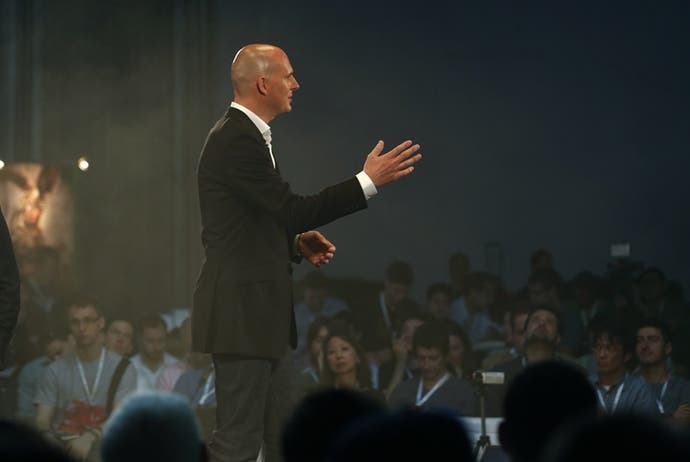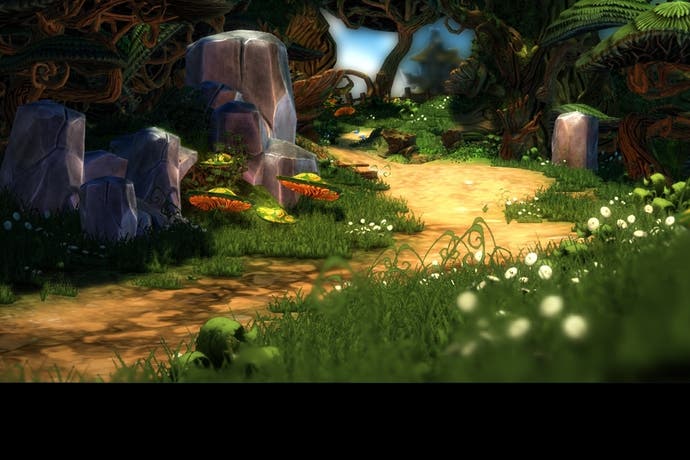What Indie devs @ Xbox for Xbox One means for gamers
Microsoft's new indie game chief wants "something crazy".
Yesterday Microsoft announced its Xbox One self-publishing program and with it opened up its marketplace to a raft of independent developers who previously were unable to get their games onto the Xbox platform.
ID@Xbox is run by former director of portfolio for Xbox Live Arcade and veteran independent developer Chris Charla, who spoke to Eurogamer at Gamescom about the program and what it means for gamers.
According to Charla, Microsoft's new rules mean gamers will benefit from new types of games - and he hopes to see "something crazy".
"The game I'm most looking forward to is the game I can't even conceive of right now," he said. "I want to see the independent developer who's going to take something like Kinect and combine it with the tiny actuator motors we have now in the triggers in the Xbox One controller and do something crazy.
"That's what I think is so great about the program: because it's really open and we're saying, 'hey, show us what you've got,' we're going to see a flowering of games we can't even predict right now.
"When I think about some of the things we're doing on Xbox, whether it's SmartGlass, some of the cloud stuff or Kinect, or the controller... some of the things people will be able to do with that, subtle things, they're going to create games we can't conceive of. I'm most excited about being shocked and amazed."
Microsoft has for some time now suffered criticism from indie devs who have had bad experiences with Xbox 360. The company's strict policies have prevented some developers without publishers from selling games on XBLA, and many who have managed to sell on XBLA have complained about a lack of visibility for smaller titles on the dashboard.
For Xbox One, the Xbox Live Arcade and Xbox Live Indie Games sections have been done away with for an all-encompassing marketplace that treats all games equally, Microsoft said. It's dropped patch fees and promised to streamline its certification processes. It even plans to, eventually, make all retail Xbox One units developer kits.
"The game I'm most looking forward to is the game I can't even conceive of right now."
ID@Xbox director Chris Charla
Throughout 2013 Sony has been praised by developers for the open platform that is PlayStation Network, and for courting indie developers and their games for PlayStation platforms, including the upcoming PlayStation 4.
Today on Xbox 360, every XBLA game needs a publisher, either a third party like Activision or EA, or Microsoft Studios, Microsoft's first-party publishing arm. At E3 in June Microsoft said it was sticking with this policy for Xbox One.
Clearly, the company changed its mind fairly recently, but Charla insisted Microsoft's desire to improve the way it works with independent developers has "always been part of the plan".
"We're constantly talking to developers and trying to figure out how we can improve our programs for them, ultimately with the goal of making sure we have the best possible games on the box for consumers," he said.
"When I was at XBLA we talked to developers constantly. For this program specifically we've been talking and planning for months to more than 50 developers, guys we know, guys we work with, guys we used to work with, guys who love us, guys who have been critical of us. We had some ideas of what we thought was the right thing to do, and we tried to get feedback on that."
"Xbox One isn't just a great machine for enjoying entertainment. It's a machine for creating too. The ultimate goal is anyone will be able to create games on Xbox One."

Charla said that while developers requested many different changes for the Xbox One, all agreed on one thing: equality.
"People wanted to make sure they were not segregated in a different marketplace," he said. "They wanted to be in the same marketplace as all the other games. This fit in with our strategy on Xbox One, that games are games are games. We think independent games are fantastic and can easily hold their own in the marketplace next to other fantastic triple-A games. And we think consumers are excited to have that kind of diversity of content available to them."
To self-publish on Xbox, indies must first apply through an application form on the newly launched Xbox.com/ID website. Once approved, the developer will be officially registered to create games on Xbox One and will be issued two dev kits free of charge. At this point Microsoft will provide developer account managers who will help them through the process of making games on Xbox One.
Charla explained how Microsoft decides whether to approve or decline a developer's application.
"At the first phase of the program we're really looking for developers who we know are going to be able to ship on Xbox One," he said. "That's more established developers who probably previously shipped on Xbox 360 or another console, or mobile or tablet.
"But we're looking to open up the program as broadly as possible and as quickly as possible, with the ultimate goal of every Xbox One retail kit being able to be used to develop games."
When the developer is close to shipping its game, Microsoft release managers will get in touch to figure out the details of passing through the company's certification process unscathed. Then, all being well, the game is put up for sale. "We want to make it as straightforward as possible for the developers," Charla said.
He added: "Ultimately we want to be as inclusive as possible. Our vision is every single person who has an Xbox One, in addition to using it as a great way to enjoy a broad variety of entertainment, can use it to create. Whether that's a triple-A developer who's in a team of hundreds of people, or a small team or a lone person, or even a hobbyist, we want to make sure there's something for all them. And even for people who can't program at all, like myself, I can get Project Spark and make game experiences without even knowing how to code.
"It goes back to that vision: Xbox One isn't just a great machine for enjoying entertainment. It's a machine for creating too. The ultimate goal is anyone will be able to create games on Xbox One."
"At the first phase of the program we're really looking for developers who we know are going to be able to ship on Xbox One."
While ID@Xbox is an important step in the right direction for many indie developers, it does not make Xbox One as open a platform as, say, the App Store - although given the Wild West nature of the App Store and the varying quality of games available on it, this may be no bad thing. As it stands Microsoft controls who can release games for Xbox One, and will continue to imposes a certification process on games and title updates.
"All games need to be certified on Xbox, which is part of our promise to our consumer that they're going to get a high quality experience and it isn't going to break in some way," Charla explained.
"But we're always working to make that process more straightforward and streamlined for our development partners."
In June Eurogamer revealed Microsoft had scrapped the patch fees it charged developers to issue title updates to Xbox 360 games. This remains the case for Xbox One, but how will certification of these patches work?
According to Charla, there are multiple ways a developer can update their game, some of which need to go through certification, and some of which that don't.
"If you're making changes to just data, for example tweaking stats in a fighting game, you can make those changes without having to update the executable," he said. "It's an instant update. It's not something you have to do a full title update for. But if you do a title update you need to go through cert."
Deciding on a release date and a price for a game is a collaborative process. Charla confirmed that Microsoft will work with developers to decide on the best time to release their games. "We want to ship the game when the developer wants to ship the game," he said, "but we'll work with them to figure out what the best time is."
When it comes to pricing, developers set the wholesale price of their games, but Microsoft sets the retail price.
"We promise we'll pay the wholesale price," Charla said. "If we end up charging more for whatever reason - perhaps we think the game is worth more - we'll pay an industry standard split. So basically we'll pay the industry standard split or the wholesale price, whichever is greater."
Microsoft had insisted on exclusivity for games it's published on Xbox Live Arcade. (You can read more about its XBLA policies in a Eurogamer investigation published in 2011), but Charla said these rules had been relaxed for Xbox One.
"We don't require some exclusivity period," he said. "We're not asking for six months of exclusivity or something like that. We really want original games in the program. That's our focus."



